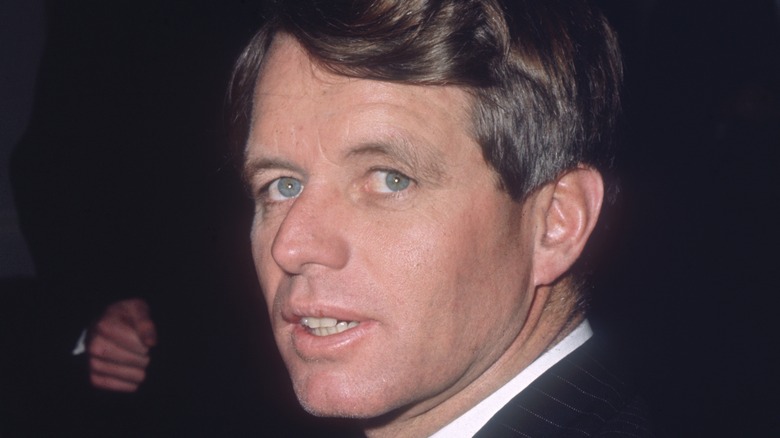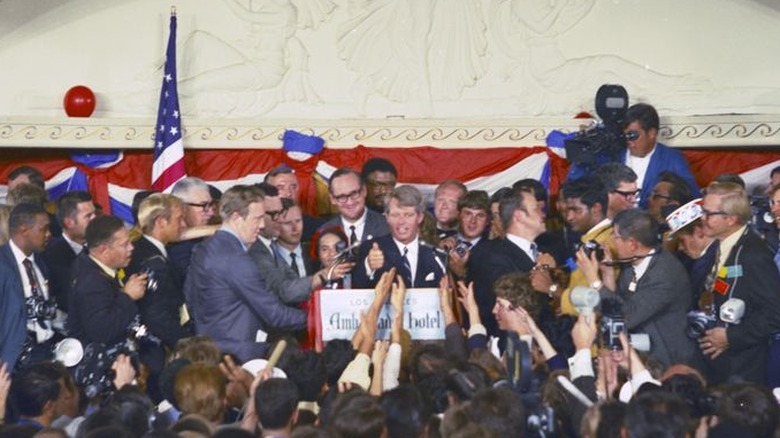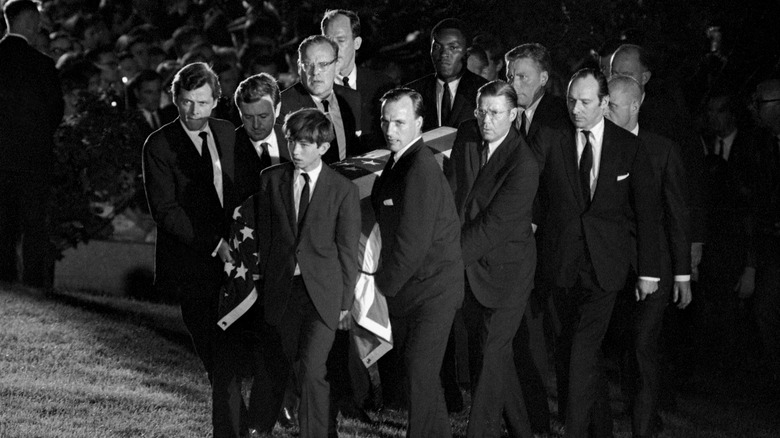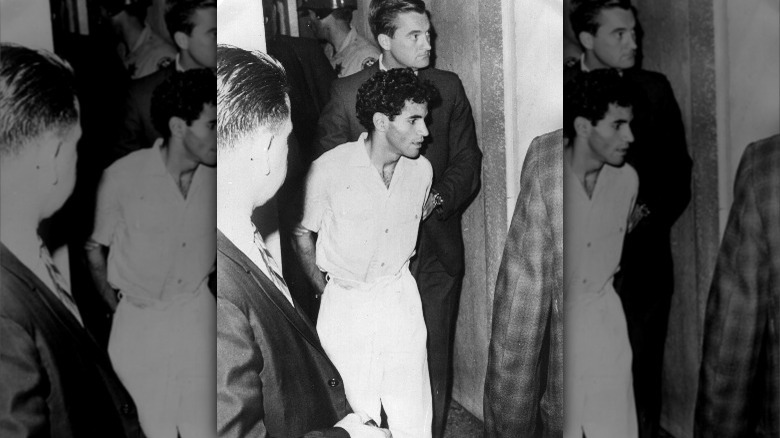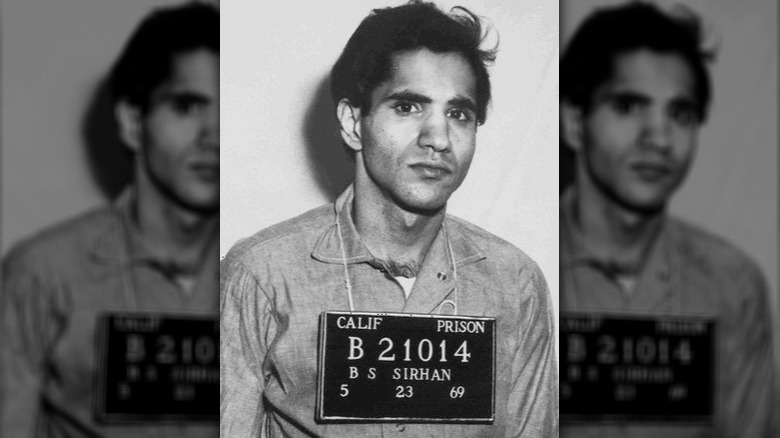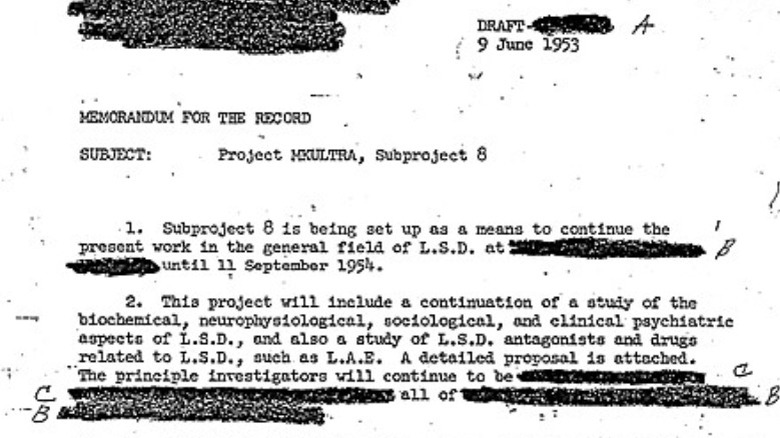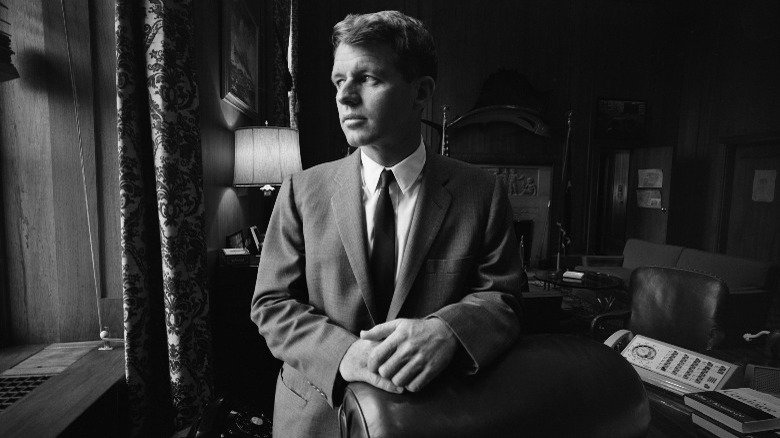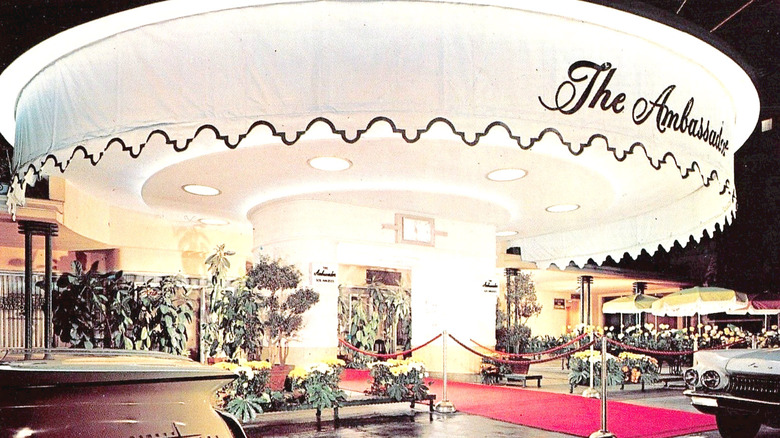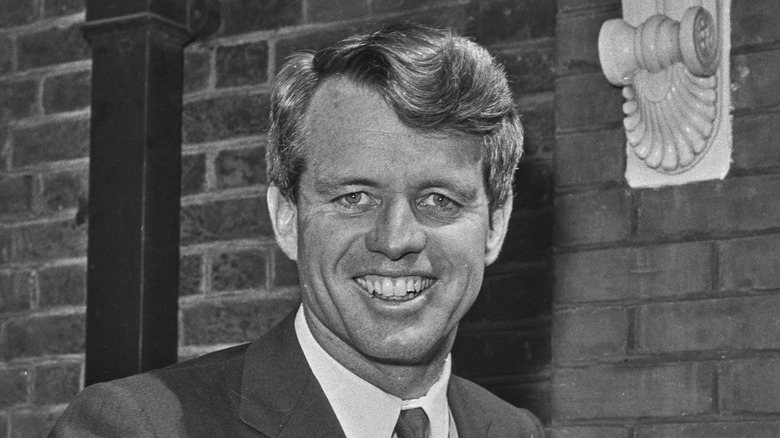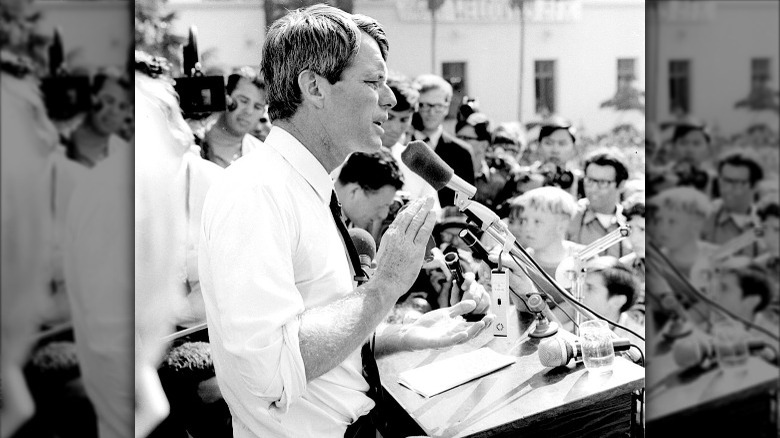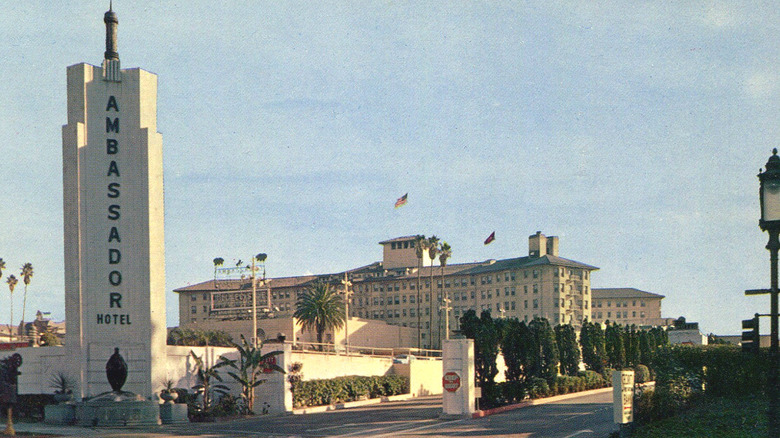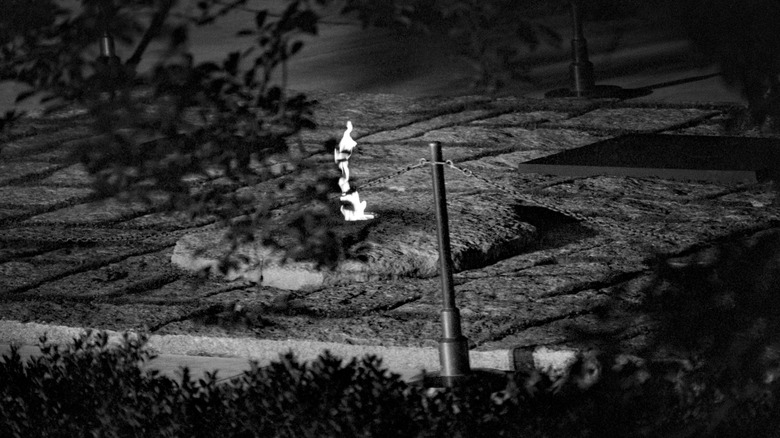The Bobby Kennedy Assassination Theory That Would Change Everything
Assassinations of high-profile individuals throughout history have always drawn the eyes and the interest of the public at large. The most obvious example of this is, without a doubt, the assassination of President John F. Kennedy. For real, good luck trying to find any information about that without running into a conspiracy theory or two. Or maybe a couple dozen: A second shooter. The Umbrella Man. The whole thing was a covert operation by the CIA. You name it, the conspiracies exist.
But the JFK assassination is far from the only one shrouded in mystery. It's not even the only assassination within the Kennedy family that's been surrounded by controversy. Fast forward only a handful of years after the JFK assassination, and you come upon the assassination of Kennedy's brother, Robert F. Kennedy. Like the earlier Kennedy assassination, this story is just as odd and filled with strange holes that can't be easily explained, so it only follows that equally bizarre theories abound. And, of course, with the CIA being the CIA (especially in the mid-20th century), they're at the center of a number of those theories. Truly, it's quite the story fit for a spy thriller.
The assassination of Robert F. Kennedy
Well, let's start by getting some of the basic details of this whole story out of the way. According to the Kennedy Presidential Library and Museum, Robert F. Kennedy was born into the powerful and prestigious Kennedy family, and he charted an impressive course through the governmental ranks. With experience under his belt regarding foreign affairs during his brother's presidency, he announced in 1968 that he would be running for the Democratic presidential nomination, a choice that brought plenty of hope to a public that was tired of the growing tension and fear.
But he would only run for that nomination for a few months. Per History, on June 4, 1968, Kennedy had just won the California presidential primary and was giving a speech at the Ambassador Hotel in Los Angeles. With the excited cheering of his supporters behind him, Kennedy began to leave the hotel through the kitchen (via The Guardian). But just after the clocks struck midnight, 24-year-old Sirhan Sirhan appeared from the crowd wielding an eight-shot revolver. He fired a number of times, hitting and wounding a few people before being wrestled to the ground. And somewhere in the fray, Kennedy himself was hit, taking a shot from behind, just by his ear. Sirhan was arrested and given the death sentence (which has since been commuted to life in prison), but the damage was done: Kennedy died just a day later, on June 6.
Some of the facts don't line up
On the surface, the story of Robert Kennedy's assassination seems pretty straightforward. And tragic, of course, but the basic facts don't paint a particularly weird tale.
But here's the thing: The devil is always in the details. For one, as the Washington Post explains, Sirhan Sirhan was standing in front of Kennedy when he began to fire. But Kennedy took shots from behind, and investigations by the coroner uncovered powder burns on his jacket and hair – indications that those shots were fired point blank. And as far as anyone can tell, Sirhan didn't seem to be standing there at all. Weird, right?
Well, it doesn't stop there. Sirhan's revolver only held eight bullets, but many speculate that there were more than eight shots fired – some contend that the number is more like 13. In terms of where those bullets came from, well, many see that as proof of a second shooter. And in terms of where they went? Original photos from the crime scene seem to show pieces of metal – potentially bullets – lodged in the doorframe. Considering Sirhan's eight bullets are already accounted for, where else could those come from, if not a second shooter? And just to make things stranger, internal police documents referenced the idea that the bullets were fired from different guns, and that the bullet that hit Kennedy, specifically, didn't come from Sirhan's gun. Definitely the grounds for a conspiracy.
A cover up?
The more you read into all of the procedures surrounding the assassination of Robert Kennedy, the more there is to wonder about. In a lot of ways, it starts to smell a little like a cover-up.
Let's start with Sirhan Sirhan's trial. Per the Washington Post, Sirhan did confess to the crime but also admitted later that he only did so at his attorney's recommendation. And that same attorney decided to make the argument that Sirhan had "diminished capacity" – essentially a guilty verdict, but one that might avoid the death penalty. But that was done without ever bringing up the fact that Kennedy was shot from behind, the kind of detail that you'd think might help Sirhan's case. Sort of odd to leave something like that out, right?
The investigation of the scene also leaves something to be desired. In fact, Paul Schrade – a friend of Kennedy's who was also shot and wounded during the crime – has said that he believes the police rushed the job, wanting to close the case quickly (via the Los Angeles Times). They refused to follow leads and only reluctantly reopened parts of the investigation years later (which also went nowhere). And those supposed bullets in the doorframe? Investigators insisted that those weren't bullets ... and then the evidence was destroyed. (The bullet from Kennedy's neck also disappeared a few years later, per the Washington Post.) Sure, there could be a legitimate explanation, but it sure sounds fishy. Makes you wonder if there was more happening behind the scenes.
Sirhan Sirhan might have just been the fall guy
Now, to be entirely clear, Sirhan Sirhan was caught at the scene of the crime, and, per History, he confessed to everything at his trial. He even confessed to having reasons to dislike Robert Kennedy. And on top of that, as told by the Washington Post, there's plenty of evidence against him. He'd brought a gun to the scene of the assassination – a scene that he'd staked out for about 30 minutes prior. And investigations of his personal belongings didn't help him, either. He had a newspaper clipping that was critical of Kennedy in his pocket, and investigators later found notebooks at his home with the words "RFK must die" scribbled in them over and over.
But there's something that's still weird. Those scribblings on notebook pages are incriminating, but Sirhan has since admitted that he doesn't actually remember writing any of those notes. The Guardian further points out that the writing itself – quoted there as "RFK must die RFK must be killed – Robert F Kennedy must be assassinated before 5 June 1968" – is oddly robotic. Perhaps the ravings of a madman, or maybe proof of something more sinister. After all, Sirhan has further admitted that he actually doesn't remember the shooting at all. As for what he does remember: "Being led into a dark place by a girl who wanted coffee." And then being choked by a mob. This has led to another theory – Sirhan was in a brainwashed trance, forced into doing it by someone much more powerful.
Brainwashing might not be as far-fetched as it sounds
Sure, yes, the idea of a brainwashed assassin sounds very "Manchurian Candidate" and all that, but in truth, it's not quite as close to fiction as it may sound. Frankly, there's a whole lot that can be said on the topic, but in short, the CIA did spend the 1950s and 1960s researching mind control. According to History, American POWs reportedly returned from stints in Korea having been brainwashed into believing Communist ideals. The CIA suddenly felt they were at a distinct disadvantage when it came to these complex mind games and naturally spent a whole lot of time trying to figure out how to weaponize hypnosis and drugs.
A project known as MKUltra is one of the big names when it comes to this particular research, and it revolved around the use of drugs, especially LSD, as a means of brainwashing subjects (via History). Consent for many of these experiments was dubious at best, and the whole venture was both very secret and very illegal.
When you look at publicly available records, the whole thing doesn't seem all that successful. But that may not be the whole story. CIA agents claimed that they couldn't remember the details while on trial, and all physical records were destroyed. Combined with the fact that long-term, advanced hypnosis techniques have largely untested results (via Live Science), well, maybe brainwashing isn't out of the question.
The CIA didn't like Kennedy
To be entirely fair, picking apart strange inconsistencies and entertaining potential conspiracies isn't enough to actually implicate the entire CIA in the assassination of Robert Kennedy. Yes, the CIA was involved in some pretty shady work, especially during the Cold War, but speculation isn't anything concrete. And no, looking for a motive isn't necessarily incriminating either, but it definitely paints an interesting picture. Because, at the end of the day, members of the CIA just didn't like Kennedy.
According to The Guardian, David Sanchez Morales – a senior CIA agent often known for his work with covert operations – was pretty open about his dislike for the Kennedy family, blaming them at large for the failure of the Bay of Pigs operation back in 1961. Almost a decade and a half later, he reportedly told friends that Robert Kennedy deserved to be assassinated. Per Lisa Pease's "A Lie Too Big to Fail," Robert A. Maheu, an ex-FBI agent who handled some of the CIA's more unsavory missions, was also spotted effectively celebrating with Don Nixon over RFK's death, with how it cleared the way for Richard Nixon to win the upcoming election.
To top things off, Kennedy also directly opposed the CIA's power, and he could have eventually pressed the organization for more answers about the death of his brother, John F. Kennedy (via the Washington Post). And if you ascribe to any of the theories about the JFK assassination, well, you can see where the problems arise.
A few high-level CIA operatives might have been on the scene
So it's one thing to take inconsistencies and weave them into a fantastical tale of conspiracy and intrigue, but it's another to start pulling in actual sightings of certain people around the scene of a crime. And that's where more specific theories about the CIA's role in Robert Kennedy's assassination start coming in. The Guardian outlines one of those theories, put forward by screenwriter Shane O'Sullivan, pointing out that three high-level CIA operatives were all hanging around the Ambassador Hotel around the time of Kennedy's assassination for reasons that aren't exactly known.
David Sanchez Morales – who was supposedly stationed in Laos at the time – was caught on camera in the Ambassador Hotel just after the end of Kennedy's speech, only to reappear again 30 minutes later. Morales' associate, Gordon Campbell, was also spotted in that same room around the exact same time, and both men had actually been seen hanging around the local area in the year leading up to the assassination. Then there was also Campbell's meeting with George Joannides, one of the CIA's chiefs of psychological warfare operations, conveniently just prior to the shooting. Sure, it could be a coincidence, but the presence of a bunch of CIA operatives (and ones known for eliminating enemies, at that) does raise some eyebrows. It's hard not to imagine they were planning something.
Nothing is known for certain, of course, and other parts of O'Sullivan's theories have been questioned (via History News Network), but you have to wonder.
Robert Maheu: the real mastermind?
When you look at all the weird facts of the assassination of Robert Kennedy overall – the control over various authorities and investigators, potential access to secret CIA information and experiments – you start to realize that you'd need a really specific person to actually head this entire operation. And that's where Robert Maheu comes into the picture.
According to "A Lie Too Big to Fail," Maheu was ex-FBI, but the CIA began tapping him for certain covert operations. Eventually, some began to actually see him as an assassin, or as a "fixer" for Howard Hughes, who was also known for financing covert CIA operations (via the Washington Post). Or, if a more fun point of reference paints a better picture, Maheu is said to be the original inspiration for the "Mission: Impossible" franchise.
Over the years, a number of people, including Maheu's associates and even FBI director J. Edgar Hoover, have outright said that he was the one behind Robert Kennedy's death, and it's easy to see why. Between his access to the LAPD, Sirhan Sirhan's defense team, trained CIA agents, and the results of those top-secret brainwashing experiments, Maheu really does seem like the perfect guy for the job.
The CIA's 'contract agent' and multiple shooters
When it comes to the potential plan put together by Robert Maheu, there's another name that's worth considering: Thane Cesar. As for why? Well, that's because Cesar was known as the CIA's "contract agent," which already just sounds fishy, especially when you consider his actual employment records are pretty hazy (via "A Lie Too Big to Fail"). Oh, and it might have something to do with the fact that he was holding Robert Kennedy's arm at the moment of the shooting. And the fact that he admitted to drawing (albeit not firing) his gun at that same moment.
"A Lie Too Big to Fail" further suggests that Cesar was actually on the scene to fill his role in a rather complicated version of the multiple-shooters scenario. Essentially, Cesar was there to hold Kennedy down, incapacitating him and potentially firing off a couple of shots himself. But he didn't deliver the killing blow in this situation. Rather, another accomplice appeared with an easily concealable gun, firing a couple of shots into the back of Kennedy's head.
But that's not all. At the same moment, another shooter appeared in front of Kennedy, somewhere near Sirhan Sirhan (and purportedly on top of a table) to fire off a few shots, just to make sure it looked like Sirhan had committed the crime. And as for Sirhan himself? The theory posits that he was only ever shooting blanks.
Covering the exits
"A Lie Too Big to Fail" makes a pretty decent effort to emphasize that this was no small-scale operation. No, this was the kind of thing that required a whole team to make it work, and so while there was a group of people tasked with actually killing Robert Kennedy (and framing Sirhan Sirhan), there were others who needed to keep the whole operation running smoothly.
The theory mentions an accomplice stationed at one of the fire exits, a man who stood out for communicating on a suspicious radio, and who was likely there both to allow Sirhan entry to the building and to ensure that the door wouldn't be blocked when the assassins needed to make their escape. What's more, there's a reference to two girls in polka dot dresses, one of whom accompanied Sirhan upstairs to the kitchen, but another who escorted a different man downstairs. But why the need for what appeared to be two separate teams of assassins? Well, just in case Kennedy didn't end up exiting through the kitchen, the whole operation had a backup plan. No matter what path Kennedy took after his speech, the assassination could still go off without a hitch.
High-profile players may have admitted their guilt already
In the aftermath of Robert Kennedy's assassination, there have been some pretty suspicious things said by a number of people potentially involved in the supposed plot. In all honesty, "suspicious" might be a bit of an understatement.
"A Lie Too Big to Fail" focuses squarely on some of John Meier's diary entries, but specifically regarding the behavior of Robert Maheu in the days following the crime. Meier began making connections and asking questions upon hearing that Thane Cesar had been at the Ambassador that day, but doing so brought swift retribution from Maheu. Not only was it a clear threat to stop looking into things, but the fury laced in the words surprised Meier. (Plus, that apparently wasn't the only time Maheu acted shifty and irritable about information surrounding the assassination.)
But if that's not enough, then there's something that David Sanchez Morales reportedly told a group of friends in 1973 (via The Guardian): "I was in Dallas when we got the son of a b**** and I was in Los Angeles when we got the little bastard." That sure does sound like a confession, doesn't it?
